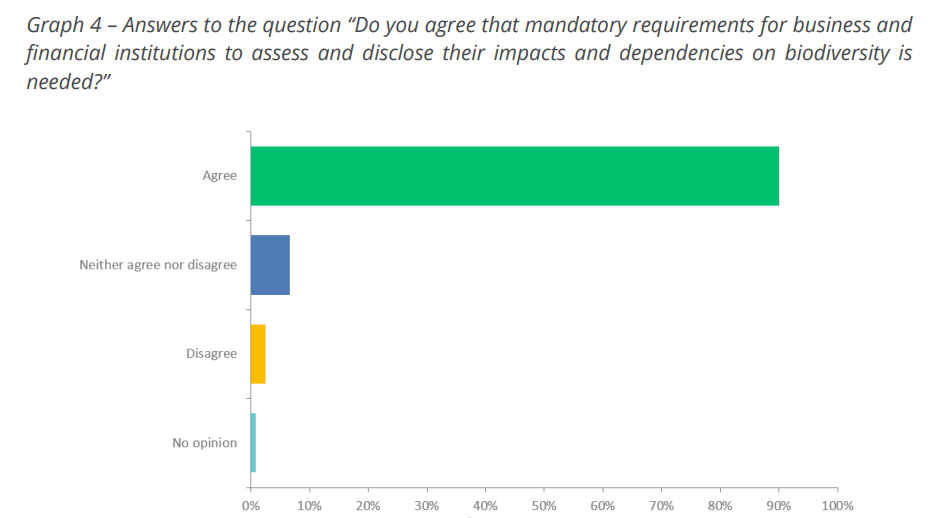Next round of nature negotiations must deliver real progress
Business for Nature updates its recommendations to secure an ambitious Post-2020 Global Biodiversity Framework
Business for Nature was encouraged by the resumed nature negotiations in Geneva in March after a two-year delay. While the level of energy and enthusiasm to reach an agreement was palpable, we were left disappointed that many elements of the text were not agreed on. This leaves much work to do during the next round of negotiations due to take place 21-26 June in Nairobi.
With a month to go before the next round of meetings, Business for Nature has updated its position on the Global Biodiversity Framework outlining specific language business leaders would like to see in the final agreement in order to spur ambitious action from the private sector and secure a nature-positive future.
Our position sets out a number of key text proposals that, if adopted, would send the right political signals to businesses on the need to halt and reverse nature loss by 2030 and create an opportunity for real economic change which delivers benefits to climate, nature and people.
While we welcome stronger recognition on the role of business and financial institutions in co-leading the transformation and the need to value and embed nature in all decision-making by mainstreaming nature in all sectors, key elements still need to be strengthened, improved and refined.
The “asks” cover three areas where business has asked policymakers to help the private sector go further and faster:
Adopt an ambitious Target 15 that requires business and financial institutions to transform their business practices. Only a target that includes effective mandatory and regulatory requirements will accelerate business action at the scale that science requires. Target 15 must therefore include:
Mandatory requirements to assess and disclose impact and dependencies on biodiversity.
A numerical figure to incentivize business to reduce negative impacts by at least half and increase positive impacts to align all activities with a nature-positive economy.
Impacts across both operations and value chains where most impacts occur.
Raise the ambition in Target 18, in consideration of the latest research estimating environmentally harmful subsidies to be at least US$1.8 trillion per year. Target 18 must commit to:
Reform environmentally harmful subsidies by redirecting or eliminating them.
Reform ALL environmentally harmful subsidies, including indirect and direct incentives, subsidies or tax exemptions.
Reduce environmentally harmful subsidies by at least USD 500 billion per year.
Scale-up positive incentives to align all public financial flows to a nature-positive economy.
Adopt a clear, simple and rallying mission to halt and reverse biodiversity loss by 2030 to build a nature-positive world based on the strong consensus expressed by Parties and Observers on this proposed mission at the OEWG3.
These recommendations were informed by a business consultation in May 2022 where over 130 businesses expressed their views on Target 15.
This amended position builds on our policy recommendations and on the momentum of our Call to Action, Nature Is Everyone‘s Business, through which more than 1,100 companies which revenues of more than $5 trillion are urging governments to adopt policies now to reverse nature loss.
To learn more about our position, watch the recordings of our webinar “Why are leading businesses calling for an ambitious Target 15 and how can it be implemented?“ which took place on Monday 30 May 2022.
Morning session
Afternoon session
The webinar started with a quick overview of our recommendations on Target 15. Key actors and leading companies addressed the following questions providing examples from the business experience:
How can business implement an ambitious Target 15?
Nadine Mccormick (WBCSD) presented the high-level business actions that companies can take today to start or strengthen their nature-positive journey.
Unilever presented its strategy for climate action, protect and regenerate nature as well as their commitments for a waste-free world.
We heard from Syamala Gowri on how Jayanti, a leading company in India, plans to reduce negative impacts across supply chain and ensure 50% of total produce is sustainably sourced.
Guus van Laarhoven talked about how FireslandCampina is implementing its target to reduce negative impacts by approximately 40%, including 38% carbon reduction and 40% ammonia reduction, avoiding land use change and other negative impacts.
Why are mandatory disclosure requirements necessary?
We heard from Tony Goldner (TNFD) about how TNFD will assist business and financial institutions in assessing and disclosing impacts and dependencies on nature .
Isabel Tomé Esteban (Iberdrola) explained that the company has already put this into practice by publishing four reports since 2004 and explains why we need to go beyond voluntary actions.
How can we measure success?
Oscar Sabag (SBTN) gave an overview of the Science-Based Target Network which aims to support companies to establish the most impactful targets based in science.
Renata Pollini (Holcim) explained how they developed the BIRS methodology and their plan to implement it in all Holcim’s sites by 2030.
Finally, we heard from Sharon Brooks (UNEP-WCMC) on how governments can measure progress on Target 15 combining biodiversity metrics with business disclosure and national reporting.
To wrap up, Charmian Love and Marcelo Behar from Natura &Co gave some closing remarks on the urgency to take action now and highlighted that business are ready to engage in the implementation of an ambitious Target 15.
The transition to a nature-positive world that will ensure that people can live in harmony with nature is both necessary and achievable. Business for Nature stands ready to work together to help deliver a Global Biodiversity Framework that accelerates collective leadership on nature and secures a healthy, equitable and prosperous future for us all.




